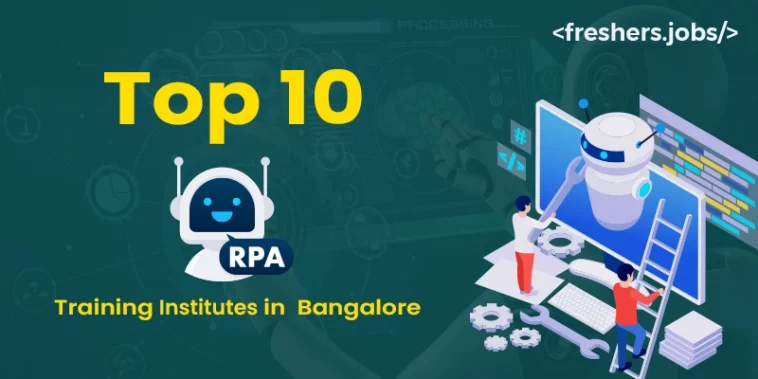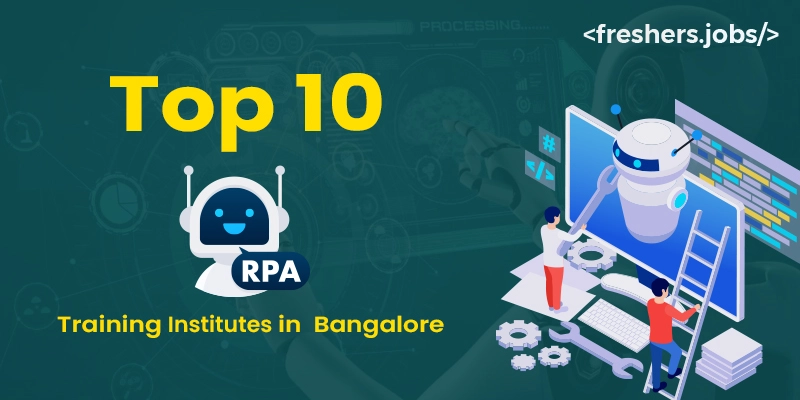The cutting-edge technology known as Robotic Process Automation, or RPA, has garnered significant attention in today’s dynamic business landscape. It centers on the use of software robots, or bots, to automate rule-based and repetitive operations. In the contemporary business environment, characterized by the importance of agility and efficiency, adopting RPA has become a strategic necessity.
It enables organizations to assign human resources to more strategic and creative tasks, fostering innovation and propelling overall business growth. We will explore the Top 10 RPA Training Institute in Bangalore, examining their current role in business, advantages, key considerations, and employment opportunities.
Listed below are the top 10 RPA Training Institute in Bangalore.
- FITA Academy
- Edureka
- Simplilearn
- Intellipaat
- Besant Technologies
- Inventateq
- Upshot Technologies
- Indras Academy
- myTectra
- ECare Technologies
FITA Academy
FITA Academy, a prominent training institute, offers a comprehensive array of 120+ courses accessible both online and offline. The institute has a strong track record in the business and is well-known for offering professional and technical credentials. More than 1,000 highly experienced trainers make up the institute’s staff, and they have influenced the academic paths of more than 75,000 people. With branches in Bangalore, Chennai, Pondicherry, Coimbatore, and Madurai, the institute provides excellent instruction. By this calculated growth, people in different areas will have access to excellent training options.
Why is FITA Academy the ideal choice for RPA Training in Bangalore?
The institute provides thorough RPA training in Bangalore, covering topics from basic to complex. The course covers Robotic Business Processes in great detail and makes use of programs like Automation Anywhere, Blue Prism, and UI Path. Task Bots, Control Room, Task Editor, Command Categories, Control loops, Internet Automation, and Application Automation are just a few of the tools that participants will receive extensive instruction in. Real-world capstone projects are a feature of the course, guaranteeing practical project deployment experience. FITA Academy provides weekday and weekend class options along with flexible batch schedules at a reasonable cost. In addition, participants are qualified for placement assistance upon completion of the course.
Tailored Curriculum for RPA Course in Bangalore
FITA Academy presents a specially crafted curriculum for its RPA Course in Bangalore, meticulously covering the fundamental principles of RPA. The curriculum comprehensively addresses critical aspects of Automation Anywhere, Blue Prism, and UI Path, providing insights into integration services, workflow modules, high reusability levels, and other foundational concepts in RPA. Covered topics include tool architecture, evolutionary features, client addition processes, operational functionalities in the control room, Task Bots, Process Automation, Control Room, Task Editor, Command Categories, Control Loops, and more.
The syllabus of RPA Course in Bangalore guides students through keystrokes, mouse actions, execution of commands related to programs, files, and windows, web recording, launching websites, internet-related commands, interaction with applications (reading from CSV/text, Excel, databases, and XML), error handling, image recognition, screen capture, integration, OCR, email automation, terminal emulator, PDF integration, running and stopping tasks, managing system-related tasks, printers, services, miscellaneous commands related to interactive prompts, message boxes, clipboards, and more. Additionally, it includes insights into Internet Automation, Application Automation, and Real-Time Capstone Projects, ensuring a comprehensive understanding of RPA principles and preparing students for real-world challenges.
Expert Trainers at RPA Training Institute in Bangalore
The training at this RPA Training Institute in Bangalore is conducted by experienced trainers with substantial hands-on expertise in the industry. These committed instructors impart theoretical knowledge and share valuable real-world insights with students, ensuring they stay abreast of the latest industry trends and are thoroughly prepared for the dynamic field of RPA.
Project Presentation Sessions at Robotic Process Automation Training in Bangalore
A distinguishing feature of this Robotic Process Automation Training in Bangalore is the inclusion of project presentation sessions. Acknowledging the significance of practical experience in mastering RPA and preparing for a successful career, these sessions enable students to apply acquired knowledge and principles in real-world scenarios, providing valuable hands-on exposure.
Complimentary Placement Sessions after RPA Training in Bangalore
FITA Academy extends its commitment beyond the classroom by providing complimentary placement sessions as part of its comprehensive RPA Training in Bangalore. These sessions cover essential aspects like resume building, refining interview skills, job placement assistance, and career guidance. The meticulously designed placement session aims to assist students in achieving their career objectives. With an extensive network of more than 1,500+ partner companies, FITA Academy facilitates job placements for graduates, offering diverse opportunities within the industry. This extensive network ensures students have access to promising career prospects, facilitating a smooth and successful transition into the professional world.
Edureka
Edureka stands out as a reputable online platform, providing a flexible RPA Course that covers fundamental to advanced concepts. Despite offering a comprehensive range of courses, the institute’s primary focus on online learning might limit direct interaction between learners and trainers, potentially leading to higher costs.
Simplilearn
Simplilearn specializes in delivering RPA Classes for both beginners and advanced learners and features a curriculum enriched with valuable learning materials. However, the strong emphasis on online classes may impact the level of direct interaction between instructors and students, and the course cost could be relatively higher compared to alternative institutes.
Intellipaat
Intellipaat aims to enhance skills and impart valuable industry knowledge through its RPA Courses. The predominant focus on online courses may reduce direct interaction between learners and trainers.
Besant Technologies
Besant Technologies offers comprehensive RPA Classes with real-time assistance. Despite these facilities, it might not be the preferred choice for individuals seeking a more profound learning experience.
Inventateq
Inventateq specializes in tailored RPA Courses designed to meet industry-specific requirements. But they may not provide as comprehensive placement support compared to certain other institutes.
Upshot Technologies
Upshot Technologies provides an extensive RPA course to equip learners with essential skills. But they may not be the ideal choice for those seeking a more extensive and in-depth learning experience compared to other institutes.
Indras Academy
Indras Academy is known for providing specialized RPA Classes tailored to industry-specific needs. But they may not offer as comprehensive practical training compared to other institutes.
myTectra
myTectra specializes in delivering comprehensive RPA Classes covering a range of concepts. Despite offering these benefits, the level of placement support provided might be relatively less extensive compared to certain other institutes.
Ecare Technologies
Ecare Technologies offers RPA courses focused on imparting essential skills to students. But it’s worth noting that the practical training component may not be as extensive compared to some other institutes.
Freshers Jobs carefully selected these institutes through thorough research, considering factors like brand reputation, student feedback, and a proven track record of student achievements.
Role of RPA in the Modern Business Landscape
Robotic Process Automation (RPA) revolutionizes traditional workflows and operations. RPA uses software robots, or bots, to automate repetitive, rule-based tasks. This frees up human resources to work on more complex and strategic projects. By removing manual errors, this technology improves accuracy, lowers operating costs, and increases efficiency. RPA increases efficiency and streamlines procedures, which is especially helpful in the financial, medical, and customer service sectors. It is a versatile option for companies trying to remain competitive and adaptable in the ever-changing business environment because of its scalability, agility, and interoperability with existing systems. RPA helps firms to deploy human talent to jobs that require creativity, critical thinking, and strategic decision-making by automating repetitive tasks. This promotes innovation and drives long-term growth.
What is RPA?
RPA, also known as Robotic Process Automation is a revolutionary technology that uses software robots to automate operations that follow rules and are repetitive within business processes. These virtual bots are programmed to replicate human interactions with digital systems, performing functions like data entry, form filling, and information extraction. RPA enhances operational efficiency by streamlining routine processes, minimizing errors, and enabling organizations to save costs. With the capability to seamlessly integrate with existing systems and applications, RPA provides a scalable and non-intrusive solution. It is extensively embraced across diverse industries to optimize workflows, allowing human workers to concentrate on more strategic and creative tasks. Positioned as a key player in digital transformation, RPA significantly contributes to heightened productivity and agility in the contemporary business landscape.
Advantages of RPA
- Efficiency and Productivity: The automation of repetitive and rule-based tasks by RPA significantly boosts efficiency and productivity. Bots can operate continuously without interruptions, leading to faster task completion and improved operational speed.
- Cost Savings: RPA lowers operational costs by reducing the necessity for human involvement in routine processes. This cost-effectiveness results from increased speed, accuracy, and the ability to manage large volumes of tasks without additional workforce.
- Accuracy and Error Reduction: RPA eliminates the potential for human errors in manual tasks, ensuring consistent and precise outcomes. This is particularly advantageous for tasks such as data entry, compliance-related processes, and others requiring precision.
- Fast Implementation: RPA solutions are usually implemented more quickly than traditional IT solutions. Companies might see a return on their investment very fast and have the flexibility to quickly adapt to changing business needs because bots can be quickly deployed.
- Flexibility and Scalability: RPA can be scaled to fit diverse departmental business processes. Because of its scalability, which allows enterprises to increase automation capabilities, it can be implemented both at the small and enterprise levels.
- Improved Customer Experience: Processes that deal with customers are more accurately and quickly automated with RPA. This enhances the client experience overall and promotes loyalty and happiness.
- Integration with Existing Systems: RPA seamlessly integrates with existing software applications and systems without significant changes to the underlying infrastructure. This adaptability ensures a smooth incorporation into the existing technological ecosystem.
- Improved Compliance: RPA supports organizations in maintaining compliance by enforcing consistent and auditable processes. Bots strictly adhere to predefined rules and regulations, reducing non-compliance risk.
- Freeing Human Resources for Strategic Tasks: By automating routine tasks, RPA allows human employees to concentrate on more strategic, creative, and value-added activities. This contributes to a more engaged and fulfilled workforce.
- Data Security: RPA platforms often feature robust security measures to safeguard sensitive data. Access controls, encryption, and audit trails help ensure the security and integrity of automated processes.
Essential Components of RPA
- Tools for Robotic Process Automation (RPA): RPA tools are the software platforms that make it easier to create, deploy, and manage software robots. Well-known RPA technologies that provide interfaces for creating automation processes, managing bots, and tracking their performance are Automation Anywhere, UiPath, and Blue Prism.
- Bot or Software Robot: The bot, also known as a software robot, is the brains behind RPA. It operates much like a software program, carrying out predetermined duties in response to commands. When it comes to interacting with apps, systems, and data, bots mimic human interactions by reliably and efficiently carrying out rule-based procedures.
- Process Definition: The actions and steps that the bot will automate are described in this step. It includes designing a process diagram or workflow that outlines the actions of the bot.
- Control Center: Administrators plan, coordinate, and oversee bot activity from this central administration center. It offers information on exception management, bot performance, and system health in general.
- Development Studio: Within the RPA tool, developers design and build automation workflows in the development studio. It includes functions to handle exceptions, define logic, record actions, and test automation prior to deployment.
- Bot Orchestrator: In charge of planning and directing bot actions, the orchestrator makes sure that bots operate effectively, that conflicts are avoided, and that job completion timelines are followed.
- Cognitive Automation: By combining technologies like natural language processing and machine learning, cognitive Automation may be included into advanced RPA systems. This makes it possible for bots to do intricate jobs, comprehend unstructured input, and adjust to shifting circumstances.
- Process Discovery: To find possible processes that may be good candidates for automation, process discovery tools examine how users interact with programs. These tools help businesses identify tasks that should be prioritized for automation and identify potential for automation.
- Bot Store: Certain RPA systems offer a store where users can download and reuse pre-built bots or automation components. It does this by providing pre-made solutions for typical tasks, hence driving development.
- Analytics and Reporting: Analytics and reporting capabilities offer insights into bot performance and the overall impact of Automation on business processes. Organizations can track key metrics, identify improvement areas, and make informed, data-driven decisions.
Job Opportunities in RPA
- RPA Developer / Analyst (Entry Level): Individuals in the role of RPA Developer, RPA Analyst, or Automation Developer at the entry-level will be responsible for developing and implementing RPA solutions. Their tasks include designing automation workflows and collaborating closely with business analysts to comprehend process requirements. This role demands knowledge of RPA tools, programming skills (e.g., Python, Java), and strong problem-solving and analytical abilities.
- RPA Developer (Mid-Level): For individuals in mid-level positions, such as Senior RPA Developers, Automation Engineers, or RPA Consultants, their responsibilities extend to leading RPA development projects. This involves designing and optimizing automation processes, working closely with business stakeholders, and mentoring junior developers. For this position, advanced RPA tool competency, process optimization, leadership, and project management abilities are essential.
- RPA Architect (Senior Level): Senior roles like RPA Architect, Lead Automation Engineer, or RPA Solution Architect involve designing end-to-end RPA solutions, providing technical leadership, formulating automation strategies, and collaborating with IT and business leaders. Expertise in RPA tools, architecture design, system integration, and strategic planning are key requirements for this role.
- RPA Project Manager: RPA Project Managers, Automation Project Leads, or RPA Program Managers take charge of managing RPA projects from initiation to completion. Responsibilities include coordinating with cross-functional teams and ensuring project delivery within established timelines and budgets. Essential skills for this role encompass project management, leadership, communication, and a thorough understanding of RPA technologies.
- RPA Business Analyst: Individuals in the role of RPA Business Analyst or Automation Business Process Analyst collaborate with business users to identify automation opportunities, gather requirements, and ensure alignment between business needs and RPA solutions. Key skills for this role include business process analysis, requirements gathering, effective communication, and a solid understanding of RPA technologies.
- RPA Quality Assurance (QA) Engineer: RPA QA Engineers or Automation Test Analysts are responsible for developing and executing test cases for RPA solutions, ensuring the quality and reliability of automated processes. Proficiency in testing methodologies, quality assurance practices, attention to detail, and a deep understanding of RPA tools are critical for this role.
- RPA Support Specialist: Automation support analysts, also known as RPA support specialists, diagnose problems and make sure automated processes run well. They also offer continuous support for installed RPA solutions. Key skills include technical support, effective problem-solving, and familiarity with RPA tools.
Robotic Process Automation (RPA) is transforming the modern business environment, providing a revolutionary answer to the challenges of the digital era. With organizations progressively acknowledging the significance of RPA in amplifying efficiency, cutting costs, and encouraging innovation, there will be an increasing demand for proficient professionals in this domain. This blog aims to delve into the Top 10 RPA Training Institute in Bangalore, examining their impact on the present business landscape, advantages, crucial elements, and job prospects within the industry.





